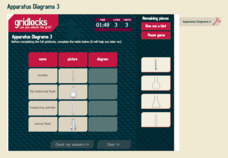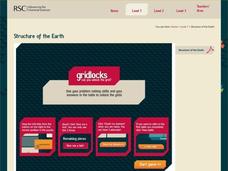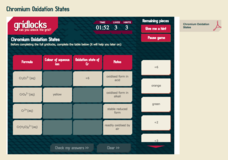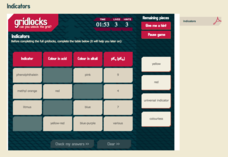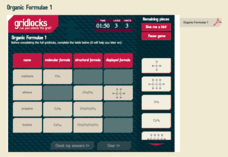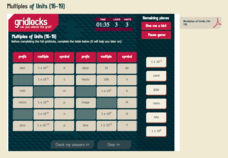Royal Society of Chemistry
Acids and Salts
How well do your young chemists know their acid-base reactions? Reinforce neutralization reaction and problem-solving skills with a challenging interactive. Learners examine the reactants, then predict the outcome in a series of...
Royal Society of Chemistry
Alkalis and Salts
Gamification is an educational sensation! Young scientists build their acid-base vocabulary skills through a series of puzzles focused on bases and the salts they form. The challenging activity comes complete with a printable version and...
Royal Society of Chemistry
Alloys
What are alloys, and why do we use them? Through a series of interactive puzzles, scholars examine the components and uses of several common alloys. The accompanying teacher's resources provide support in using the lesson, printable...
Royal Society of Chemistry
Apparatus Diagrams 3
Glassware everywhere! How do you help scholars learn to identify the different types of laboratory glassware? Introduce them to some of the main tools of the trade through interactive puzzles. Users match and manipulate items based on...
Royal Society of Chemistry
Common Compounds
Can your young chemists identify the most commonly used chemicals in the lab? Introduce the class to the go-to substances in most middle and high school chemistry experiments with an interactive. The resource offers timely feedback as...
Royal Society of Chemistry
Structure of the Earth
What lies beyond the ground beneath our feet? Young geologists learn the four main layers of Earth with an engaging puzzle set. The interactive illustrates each layer, and users must place them correctly before they can progress to the...
Royal Society of Chemistry
Testing for Gases
If most gases are invisible, how do we know so much about them? Pupils practice associating the name, formula, testing method, and outcome for four common gases using an interactive. Users build on the content of their first puzzles to...
Royal Society of Chemistry
Naming Esters
Do your chemistry scholars know their esters? Introduce the class to the nomenclature and structural formulas of common esters through thought-provoking games. Individuals or pairs of pupils match the name with the formula before using...
Royal Society of Chemistry
Isomers of (E)-but-2-ene
One chemical formula—but how many different structures? Familiarize young chemists with the concept of isomers through simple, related games. Users identify each isomer base upon its name, structure, and type of isomerization in a set of...
Royal Society of Chemistry
Concentration of Solutions 2
Challenging and interactive—everything you need in a resource! Chemistry scholars manipulate a series of puzzles focused on molarity. The teacher's guide provides support for implementing the lesson, as well as printable materials.
Royal Society of Chemistry
Chromium Oxidation States
Colorful chromium is captivating! Science sleuths solve a series of puzzles using an interactive resource. Individuals relate the oxidation states of chromium to the colors produced when the compound is placed in acidic or basic solutions.
Royal Society of Chemistry
Moles Equations (16-19)
How many calculations can you think of that include moles? Chances are, plenty! Show young chemists the uses of the multifaceted mole with thought-provoking puzzles. Individuals identify and associate the outcomes of molar quantities...
Royal Society of Chemistry
Complex Ion Shapes
Things are really shaping up! Provide young chemists with polyatomic ion practice using an interesting interactive. Individuals complete puzzles focused on molecular geometry and complex ions.
Royal Society of Chemistry
Electronegativity Values
Finally, an electronegativity resource your class will be strangely drawn to! Skilled scientists manipulate interactive puzzles to gain an understanding of common electronegativity values. The great thing? You can conduct the lesson...
Royal Society of Chemistry
Indicators
How do chemists know what indicator solution is the perfect match for the acid or base they're studying? Discover a rainbow of indicator-related properties with an Internet resource. Individuals relate the indicator solution to its...
Royal Society of Chemistry
Organic Formulae 1
Puzzles are the formula for success in organic chemistry! Hydrocarbons abound in the first of two interactives involving basic organic molecules. The easy-to-use lesson is available online and in print form, so you can pick your delivery...
Royal Society of Chemistry
Organic Formulae 2
Is your chemistry class frustrated by the multitude of representations of organic molecules? Add some challenging puzzles to an otherwise ho-hum organic lesson and let the fun begin! The second of a two-part activity focused on basic...
Royal Society of Chemistry
pH 4: Activity
Sometimes playing games in class isn't a bad thing. Science sleuths evaluate and calculate pH and pOH with an online resource. They then manipulate concentration information and relate it during a series of puzzles.
Royal Society of Chemistry
Shapes of Molecules—Hybrid Orbitals
Take your chemistry class' knowledge of molecular geometry to the next level! Introduce orbital hybridization with a series of related games. Individuals complete a data table in the first activity, then solve Sudoku-like puzzles using...
Royal Society of Chemistry
Significant Figures
Ready to add some innovation to your significant figures lesson? Pupils practice sig fig rules using a puzzle approach. Check out the Teacher's Area for printable materials, an answer key, and strategies for implementing the resource.
Royal Society of Chemistry
Sub-shells
Is your class in a quandary over quantum numbers? Change things up by adding games to the mix! Science scholars discover the shape, number of electrons, and number of orbitals in the s, p, and d sub-shells using an interactive.
Royal Society of Chemistry
Multiples of Units (16-19)
It's a parade of prefixes! Chemistry scholars identify common prefixes used throughout the sciences using an interactive puzzle series. Learners solve puzzles by pairing the prefixes with the power of ten they represent.
Curated OER
Mathematical Magazines
Learners use ads from magazines to create data to be measured and apply the skill of estimation. They record the percentage of magazine ads that could be separated into different categories made by students through the use of logical...
Curated OER
Mr. P's Life Problem
In this life problem worksheet, students read given facts. Afterward, they use logic and deductive reasoning to determine answers to given questions. This one-page worksheet contains 11 problems. Answers are provided at the bottom of the...





